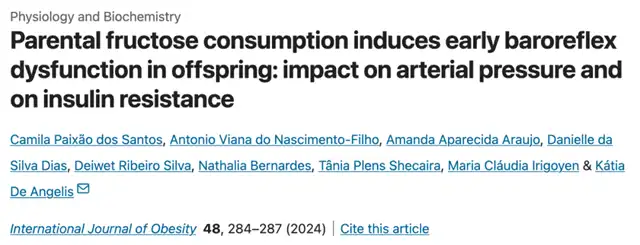Parental Fructose Consumption Increases Offspring’s Risk of Heart Metabolic Diseases
- Normal Liver Cells Found to Promote Cancer Metastasis to the Liver
- Nearly 80% Complete Remission: Breakthrough in ADC Anti-Tumor Treatment
- Vaccination Against Common Diseases May Prevent Dementia!
- New Alzheimer’s Disease (AD) Diagnosis and Staging Criteria
- Breakthrough in Alzheimer’s Disease: New Nasal Spray Halts Cognitive Decline by Targeting Toxic Protein
- Can the Tap Water at the Paris Olympics be Drunk Directly?
Parental Fructose Consumption Increases Offspring’s Risk of Heart Metabolic Diseases
- Should China be held legally responsible for the US’s $18 trillion COVID losses?
- CT Radiation Exposure Linked to Blood Cancer in Children and Adolescents
- FDA has mandated a top-level black box warning for all marketed CAR-T therapies
- Can people with high blood pressure eat peanuts?
- What is the difference between dopamine and dobutamine?
- How long can the patient live after heart stent surgery?
Parental Fructose Consumption Increases Offspring’s Risk of Heart Metabolic Diseases
Parents who consume large amounts of fructose increase the risk of their offspring developing cardiovascular metabolic diseases.
Research results confirm the information in the scientific literature that offspring of parents who consume excessive fructose are prone to metabolic disorders such as high triglyceride levels (150 mg/dL or higher) and insulin resistance. In addition, the offspring in the study showed elevated blood pressure and baroreflex damage, a physiological mechanism that helps maintain blood pressure stability.
Currently, there are 1.9 billion overweight adults and 600 million obese individuals worldwide. It is estimated that by 2030, 51% of the global population will be obese. More importantly, obesity will further lead to various metabolic diseases such as non-alcoholic fatty liver disease (NASH), type 2 diabetes, hypertension, cardiovascular diseases, and cancer.
Fructose is naturally found in fruits, honey, and some vegetables, but it is widely used as a sweetener in foods and beverages. High-fructose corn syrup (HFCS) is a key ingredient in soft drinks, cakes, candies, and cookies, being 20%-80% sweeter than pure glucose. Excessive fructose intake is closely related to the high prevalence of overweight and obesity worldwide. Fructose is metabolized in the liver, and excessive fructose intake increases fatty acid synthesis in the liver, leading to the accumulation of triglycerides and weight gain, which is also associated with an increase in inflammatory molecules involved in the development of other diseases.
According to the American Heart Association (AHA), a healthy diet should limit women’s sugar intake to 100 calories (26 grams) per day and men’s to 150 calories (39 grams) per day. The World Health Organization (WHO) recommends limiting sugar intake to 10% of daily calorie intake (e.g., for a 2000-calorie intake, sugar intake should be 50 grams). However, a 350 ml bottle of soda typically contains 38 grams of sugar.
Recently, researchers at the Federal University of São Paulo in Brazil published a study titled “Parental fructose consumption induces early baroreflex dysfunction in offspring: impact on arterial pressure and on insulin resistance” in the International Journal of Obesity.
The study found that offspring of mice that consumed excessive fructose exhibited early dysfunction in the autonomic nervous system, cardiovascular system, and metabolic system during infancy, increasing their risk of developing cardiovascular metabolic diseases in adulthood.

The team’s previous research showed that adult mice that consumed fructose long-term exhibited insulin resistance, hemodynamic changes related to inflammation, and autonomic nervous system dysfunction. Two weeks after starting a high-fructose diet, their systolic blood pressure increased.
The team was surprised by the sharp increase in sympathetic nervous system (part of the autonomic nervous system) regulation of the cardiovascular system before changes in blood glucose and triglyceride levels occurred; the overactive sympathetic nervous system was evident when blood pressure remained almost unchanged. This warns of autonomic nervous system dysfunction in regulating visceral functions.
In this study, the research team allowed mice to drink water containing 10% fructose for 60 days before mating and evaluated these newborn mice 30 days after birth and weaning.
Compared to the control group, offspring of mice that consumed excessive fructose had lower birth weights, elevated triglyceride levels, insulin resistance, increased blood pressure, and impaired baroreflex sensitivity, characterized by decreased bradycardic and tachycardic responses (i.e., abnormal slowing down and speeding up of heart rate), which was associated with reduced insulin tolerance and increased systolic blood pressure.
The research team stated that this study demonstrates a mechanism for early detection of dysfunction and suggests that children should be evaluated for early signs related to the autonomic nervous system before diagnosing hypertension or metabolic dysfunction. If children or their parents have consumed large amounts of fructose, they may develop cardiac dysfunction in adulthood. Detecting these signs early enough could potentially mitigate or delay the onset of the disease.
The research team is currently evaluating treatment options and the effects of exercise. Their previous research indicated that exercise training is beneficial for mice that have been consuming fructose since infancy or adulthood.
Parental Fructose Consumption Increases Offspring’s Risk of Heart Metabolic Diseases
(source:internet, reference only)
Disclaimer of medicaltrend.org
Important Note: The information provided is for informational purposes only and should not be considered as medical advice.



